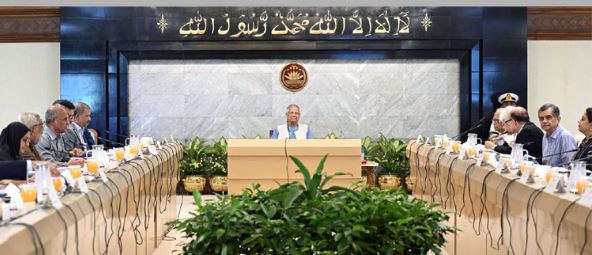News Flash

DHAKA, Nov 20, 2025 (BSS) - The interim government today gave final approval to the draft of Supreme Court Secretariat Ordinance 2025 to establish a separate secretariat of the apex court aiming to ensuring the full independence of the judiciary.
The approval came from a meeting of the Council of Advisers held with Chief Adviser Professor Mohammad Yunus in the chair at the Chief Adviser's Office in the capital's Tejgaon.
"Today, we completed the full implementation of the verdict in the Masdar Hossain case and the final step for establishing the full independence of the judiciary," Law, Justice and Parliamentary Affairs Adviser Prof Asif Nazrul told a press conference at the Foreign Service Academy here.
The press conference was organized to brief about the decisions taken in the meeting of the Council of Advisers. Chief Adviser's Press Secretary Shafiqul Alam was present on the occasion.
Noting that the Council of Advisers earlier approved this proposed law in principle, Prof Asif Nazrul said establishing a separate secretariat for the Supreme Court (SC) was among the recommendations of the Judicial Reform Commission, as well as the National Consensus Commission.
All the parties agreed during the discussions of the National Consensus Commission that there should be a separate secretariat for the Supreme Court to ensure the full independence of the judiciary, said the law adviser.
He said the desire for a separate secretariat for the Supreme Court has been present in the minds of Bangladesh's civil society for the last 20-30 years to ensure the complete independence of the judiciary.
"Today is a historic day for us. Many political parties have given many assurances, many words. Ultimately, we have now come to a good place," he said.

Replying to a question about referendum act, the Law Adviser said the interim government will enact the law on the referendum within three to four working days.
Describing about the Supreme Court Secretariat Ordinance 2025, Prof Asif Nazrul said as per the new ordinance, all powers related to the transfer, promotion, posting, and disciplinary matters of lower court judges will be transferred to the Supreme Court Secretariat from the government.
After this ordinance is fully implemented, the Ministry of Law or the government — will no longer have any control over lower-court judges, he said.
All such matters will be handled entirely by the apex court through its own secretariat, he added.
However, the adviser said, the ordinance will come into effect only after the secretariat is fully established.
“But this is not becoming effective right now, because the secretariat still needs to be established and made functional. We expect that the High Court Secretariat will be fully formed and functioning within a few months,” he said.
After that, all matters related to supervision, control, discipline, and leave of lower-court judges will be handled entirely through the Supreme Court Secretariat, he said.
Another aspect is related to financial management or financial independence of lower courts through the Supreme Court Secretariat, he said.
Prof Asif Nazrul said for any kind of development project of the judiciary — whether for the higher court or the lower courts — there will be a scrutiny committee under the leadership of the Supreme Court Secretariat.
The head of that committee, with the approval or consent of the Chief Justice, will be an Appellate Division judge nominated by the Chief Justice, he said.
The adviser said when this committee makes its recommendation, and if the estimated cost of the recommended project is up to Taka 50 crore, then the Chief Justice alone will approve it — no other approval will be required.
“If the project cost exceeds Tk 50 crore, then the Chief Justice will place it to ECNEC through the Planning Commission. Thus, the Supreme Court is being given project-approval authority up to Taka 50 crore,” he added.
Speaking on the occasion, Chief Adviser’s Press Secretary Shafiqul Alam said there were eight agenda for the meeting of the Council of Advisers and the Supreme Court Secretariat Ordinance 2025 was the most important among the agenda.
He said the government has given in principle and final approval to the draft of the Land Use Control and Protection of Agricultural Land Ordinance 2025 aimed at increasing the crop production keeping the growing population in mind.
In the ordinance, using agricultural land for non-agricultural purposes will be discouraged, he said, adding that to ensure that agricultural land is not diverted to non-agricultural activities, necessary programs and actions will be undertaken.
Secondly, importance has been given to protecting land in ecologically sensitive areas such as water bodies, wetlands, hills, hillocks, forests, the sea and coastal regions, said the press secretary.
Shafiqul Alam said the preparation of a zoning map for land use has also been mentioned.
Draft of Prevention and Suppression of Human Trafficking and Smuggling of Migrants Ordinance was given approval in principal, he said.

In the press conference, Prof Asif Nazrul said another historic verdict has been delivered today as the Appellate Division of the Supreme Court (SC) reinstated the caretaker government system, allowing civil appeals filed in this connection.
“We know that after a long struggle, we obtained the caretaker government system. It guaranteed our right to vote. Under the caretaker government, we witnessed several free and fair elections. It was always observed that the ruling party was defeated, and this seemed very natural to us,” he said.
Unfortunately, under the leadership of a former Chief Justice, a verdict was given declaring it (the caretaker government) illegal, he said.
Subsequently, the then Awami League government annulled it through the Fifteenth Amendment of the Constitution, he said.
“Initially, the Fifteenth Amendment was declared unconstitutional . . . Today, the controversial verdict given by former Chief Justice Khairul Haque, declaring the caretaker government illegal, has been overturned,” he said.
Prof Asif Nazrul said, “We can say that the caretaker government has been revived, but it will take effect after the next parliamentary election, because now that the parliament has been dissolved.”